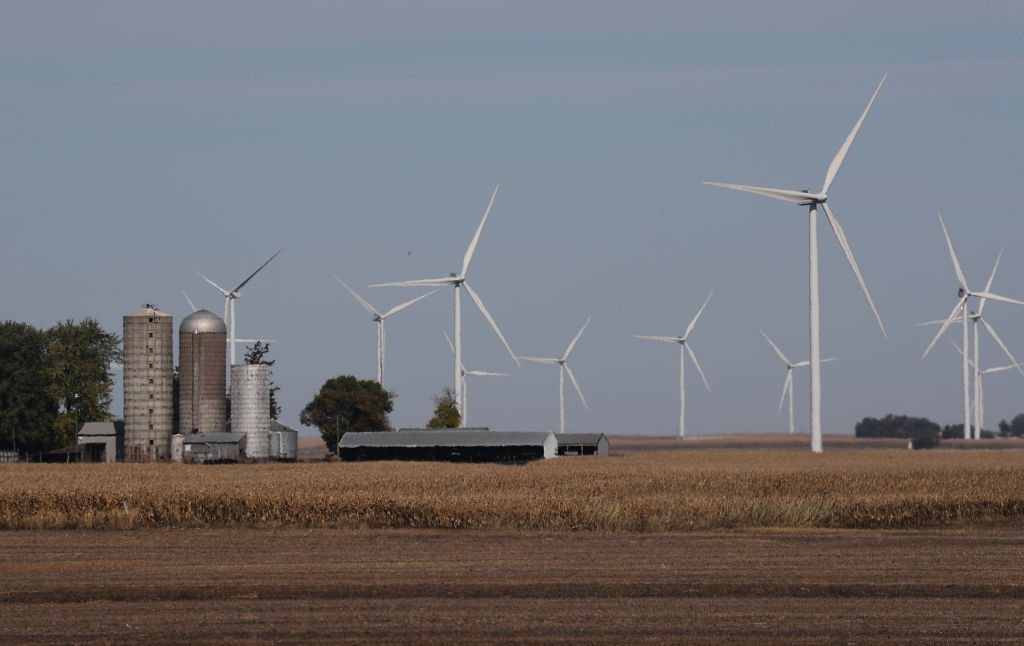Coronavirus pandemic could place hundreds of thousands of jobs in wind, solar energy at risk


A free daily email with the biggest news stories of the day – and the best features from TheWeek.com
You are now subscribed
Your newsletter sign-up was successful
Coronavirus lockdowns across the U.S. may be helping clear the air of pollution, but the pandemic has also led to a setback for the country's renewable energy industry, The Associated Press reports.
The wind and solar sectors were on good footing before the pandemic struck but now trade groups are predicting as many as 120,000 jobs in solar and 35,000 in wind could be lost when all is said and done. "There are many smaller companies going out of business as we speak," said Abigail Ross Harper, president of the Solar Energy Industries Association. "Up to half our jobs are at risk."
The wind industry is struggling to get parts from overseas, while residential solar businesses are taking the brunt of the hit in that industry since door-to-door sales aren't possible anymore, and individual customers are being cautious during the downturn. Subsequently, new solar installations could drop 17 percent this year, while wind manufacturing could fall up to 20 percent, consulting firm Wood McKenzie estimates.
The Week
Escape your echo chamber. Get the facts behind the news, plus analysis from multiple perspectives.

Sign up for The Week's Free Newsletters
From our morning news briefing to a weekly Good News Newsletter, get the best of The Week delivered directly to your inbox.
From our morning news briefing to a weekly Good News Newsletter, get the best of The Week delivered directly to your inbox.
"The industry was on a tremendous roll right up until the last month or two," said Tom Kiernan, CEO of the American Wind Energy Association. "That reversal is stunning and problematic."
But while the pandemic has caused the industry pain, there's a sense things will turn around again in the long run. Andrew Pershing, the chief scientific officer with Gulf of Maine Research Institute in Portland, Maine, for example, hopes the pandemic eventually results in an economy "that doesn't depend on burning coal and oil." Read more at The Associated Press.
A free daily email with the biggest news stories of the day – and the best features from TheWeek.com
Tim is a staff writer at The Week and has contributed to Bedford and Bowery and The New York Transatlantic. He is a graduate of Occidental College and NYU's journalism school. Tim enjoys writing about baseball, Europe, and extinct megafauna. He lives in New York City.
-
 Will increasing tensions with Iran boil over into war?
Will increasing tensions with Iran boil over into war?Today’s Big Question President Donald Trump has recently been threatening the country
-
 Corruption: The spy sheikh and the president
Corruption: The spy sheikh and the presidentFeature Trump is at the center of another scandal
-
 Putin’s shadow war
Putin’s shadow warFeature The Kremlin is waging a campaign of sabotage and subversion against Ukraine’s allies in the West
-
 TikTok secures deal to remain in US
TikTok secures deal to remain in USSpeed Read ByteDance will form a US version of the popular video-sharing platform
-
 Unemployment rate ticks up amid fall job losses
Unemployment rate ticks up amid fall job lossesSpeed Read Data released by the Commerce Department indicates ‘one of the weakest American labor markets in years’
-
 US mints final penny after 232-year run
US mints final penny after 232-year runSpeed Read Production of the one-cent coin has ended
-
 Warner Bros. explores sale amid Paramount bids
Warner Bros. explores sale amid Paramount bidsSpeed Read The media giant, home to HBO and DC Studios, has received interest from multiple buying parties
-
 Gold tops $4K per ounce, signaling financial unease
Gold tops $4K per ounce, signaling financial uneaseSpeed Read Investors are worried about President Donald Trump’s trade war
-
 Electronic Arts to go private in record $55B deal
Electronic Arts to go private in record $55B dealspeed read The video game giant is behind ‘The Sims’ and ‘Madden NFL’
-
 New York court tosses Trump's $500M fraud fine
New York court tosses Trump's $500M fraud fineSpeed Read A divided appeals court threw out a hefty penalty against President Trump for fraudulently inflating his wealth
-
 Trump said to seek government stake in Intel
Trump said to seek government stake in IntelSpeed Read The president and Intel CEO Lip-Bu Tan reportedly discussed the proposal at a recent meeting
